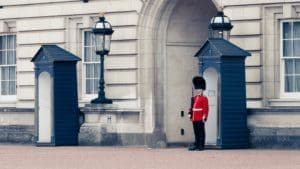 Harry and Meghan might grab headlines for their privacy settlements and use of social media, but the younger royals are hardly breaking new ground. You might say they’re just following in the family’s footsteps. In 1985, two hackers were arrested for accessing Prince Philip’s Prestel mailbox, ultimately leading to passage of the UK’s first computer crime law, the Computer Misuse Act of 1990.
Harry and Meghan might grab headlines for their privacy settlements and use of social media, but the younger royals are hardly breaking new ground. You might say they’re just following in the family’s footsteps. In 1985, two hackers were arrested for accessing Prince Philip’s Prestel mailbox, ultimately leading to passage of the UK’s first computer crime law, the Computer Misuse Act of 1990.
The Prestel Viewdata system was launched by BT (formerly British Telecom) in the late 1970s as a pre-Internet online messaging system. Infamous for its lack of security, Prestel was a hackers’ playground, with test login credentials reused on live systems.
Two journalists, Steve Gold and Robert Schifreen, set out to show BT just how insecure the system was. Testing a modem and typing in random numbers, Gold found himself inside the Prestel mainframe and the Duke of Edinburgh’s personal mailbox. They reported their work to BT, expecting thanks for their uncovering of the system’s weakness.
Hack reveals legal loopholes
Instead of recognizing an early ethical hacker situation, BT called Scotland Yard, and the authorities arrested Gold and Schifreen on charges of forgery. They were initially convicted in Southwark Crown Court under the Forgery and Counterfeiting Act.
Those charges were overturned on appeal, with the House of Lords ultimately deciding that typing someone else’s password or PIN into a system wasn’t forgery. A new law was needed, and the Computer Misuse Act of 1990 was passed to address such situations.
Gold and Schifreen went on to successful careers as IT security experts, and their archives from the Prestel hacking incident are part of the National Museum of Computing collection located at Bletchley Park.
Photo: Patrick Robert Doyle / Unsplash
